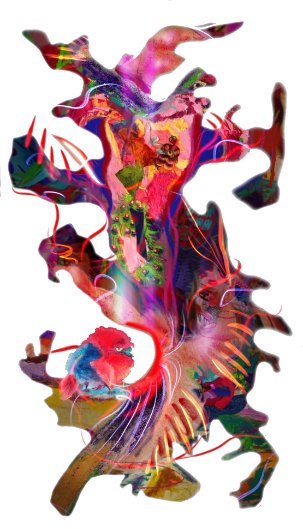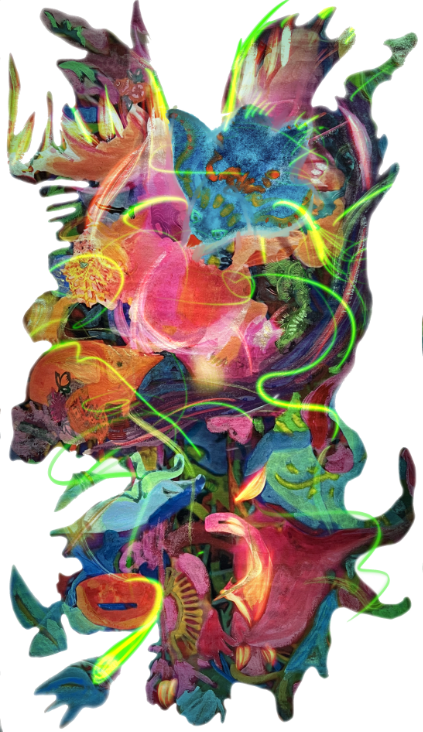Wearable Stories
Reimagine Our Past to Rewrite The Future—
poetry and ephemeral tattoos
poetry and ephemeral tattoos
This artist's book is a lyrical exploration of avian species as allegorical stand-ins for eco-feminist power and resilience. The project brings together an eclectic chorus of voices that challenge dominant narratives and provide space for overlooked stories to flourish.
Inspired by the now-extinct Dodo bird and the complex relationship between ecological destruction and societal oppression, the book immerses readers in a poetic odyssey. Annette Covrigaru's "Untitled Gaze" paints a vibrant scene of awakening, embodying life's transient beauty and vitality and setting the stage for a collection that delves into the heart of the human condition.
Starr Davis's "My Ancestors Find My Corpse and Sing to My Bones" elucidates the themes of birth, rebirth, and healing, paralleling the cyclical dance of nature and life. Meanwhile, RN Healey's "Crow" and Peggy Robles-Alvarado's "Why I Avoid Writing About Birds" unpack the tension between human expectations and avian realities, interrogating our perceptions of freedom and domestication.
Annpo Huang's "Auntie Ni," translated by Fei Li, portrays the aftermath of an earthquake, a visceral exploration of disasters, their recurring cycle, and the resilience required for reconstruction. This mirrors the endless cycle of birth, death, and rebirth inherent in nature.
In "Birds of Ghostly Loves," Sagirah Shahid takes us through a journey of memory and grief, invoking the sublime imagery of birds as emissaries of love and remembrance. Finally, Aurvi Sharma's "I Once Knew the Names of Birds" closes the collection with a powerful exploration of gender, cultural norms, and the subjugation of the feminine, invoking the myth of Sita to underline the resilience of women, paralleling that of nature.
This book invites readers into a world where the avian symbolizes feminist power, tattoos become statements of defiance, and softness and emotion challenge patriarchal narratives. It's an ode to those who dare to assert their identities and resist oppressive forces, forging connections across social and biological barriers and celebrating human beauty. It is a hymn of resistance echoing through the silence left by extinction.
Untitled Gaze
“The curtains, bristled with silhouettes
of morning branches, twinkle and dim
in the same breath. There is enough
light here to imagine the sun, and the
dragonflies, those skittish, unholy little
things, stay suspended like renounced
blessings. They mock the movements of
our love, the letters and landlines, emails
and playlists, fleeting and flightless
deliverances. Sometimes the sky
winks magenta over the city. Lap it up
like plum nectar. Carry it on the raft of
your tongue. Hold as much as you can,
wherever it fits, and set the rest ablaze.
”
My Ancestors Find My Corpse and Sing to my Bones
“You come to my bedroom window, singing me awake with a promise in your throat, it is a spiritual awakening. I am birthed in your corn-colored eyes, feasting on the last memory where I woke up in my own skin without a knife under my tongue, the peck peck of your beak against my ears is a grandmothering I desperately prayed for many nights before. How did you know to awaken me now? In all this bloody sunlight dripping through my window, in the newborn of my existent self where all my morning’s milk is sour, and the water in my wounds are stiffening the skin where life has punctured me one too many times. You come carrying all the Gods in your mouth gifting me the dawn; a death of future terrors with your hungry call for healing to begin.
”
Crow
“I ran into this crow when I was taking a walk in a place that I had never been to before.
It asked me for a cigarette. I asked if it was for a nest.
I heard somewhere (maybe a YouTube) that crows could make most anything into a nest.
“I just want. A cigarette.” The crow said, flat.
I felt disappointed with myself. I felt like my intellectual faculties had failed me.
The crow flew off, irritated.
I didn’t even think, let alone think to ask, how the crow would hold the cigarette without fingers.
”
Auntie Ni
“As the earthquake struck, the bird began to sing a melancholic lament, a poignant tribute to those who dwell in the intangible ruins of suffering. Each year, it returns to the same location, giving voice to the same sorrowful melody in remembrance of the people left behind.
On this planet, the vast majority of individuals bear witness to disasters. Within the pages of disaster reports, we encounter tales of tragedy, observe the fragile balance between life and death, express our empathy, and explore the unfolding narrative of calamity. Some may take additional steps, such as sharing messages, contributing supplies, or offering financial support. Yet, once the phone is set aside, the window closed, the channel switched, or the newspaper folded away, many forget the incident, believing they have fulfilled their responsibilities since the catastrophe bears no direct connection to their own lives. This cycle repeats itself, time and again, until the next disaster emerges.
For those directly impacted by such a catastrophe, the experience is vastly different. The moment the earthquake struck, their lives were abruptly altered, shifting like tectonic plates colliding and settling along newly formed fault lines. For these individuals, reconstruction involves more than securing a stable and safe shelter; it requires a return to normalcy and the painstaking process of rebuilding their lives.”
Why I Avoid Writing About Birds
“Mami had three wooden parakeet cages that hung in the hallway of our apartment/filled them with bright yellow and green budgies/one for each member of our family/Mine was blue/Blue budgies are bred for the pet trade/Not normally found in nature/beautiful mutants/tamed and homebound/Never meant to be seen in the wild/Mami’s birds weren’t trained to fly around knick-knacks like Tía Lety’s/Didn’t sit on the armrest and learn Spanish curse words like Tía Delia’s/Mami’s birds made static movements/plotted in loud chirps each time she opened the cage to replace soiled newspaper/aimed and lunged past her hand/their attempts for freedom failing miserably on screened windows and doors that led to other doors/If one managed to take flight in jagged swoops/perch momentarily on the bathroom curtain rod/Mami would gently clip her wings/return her to the cage/The other parakeets went unheard/the subdued budgie puffing its feathers/Mami gently speaking into the cages asking “¿Por qué me quieres dejar?”/The day I decide on leaving my parent’s house, I stole a small dented frying pan/a cracked mug no one would miss/and two soup spoons that had been in my kitchen since Tía Altagracia left el campo en Santiago and warmed our cold apartment with bowls of white rice and canned pork cooked in salsa roja/Mami noticed my clothes were missing when the blue budgie risked her wings/flew into my corner of the room where the closet door revealed my escape plan/I had already taken shoes/shirts/and jeans to the only room I could afford to rent at seventeen/Rage and disbelief soured Mami’s face/the blue budgie and I both circling the room/mapping a way out/Mami pounced/missed my neck/and landed on the sofa/Running out the front door rattling a plastic bag full of family kitchen contraband/I learned flight/The birds frantic/feathers falling from cages/Mami’s pain cutting into my stride/Her voice a cracking/A bird call of abandonment/a fight/ a flight/a surrender/all wailing at once/“¿Por qué me eres tan malagradecida?”/My wings intact/My chest rising and falling between sobs/My blue budgie circling the room/Mami’s hands ready to clip wings
”
Birds of Ghostly Loves
“In reverse
I follow their sunset chirps
saffron feathers glinting through lilac bushes, a small minaret of summoned loves.
How the memories flutter in as if to say suspend your grief
and listen. To the world,
I want to sing your name
a thousands times,
perch myself upon a branch of time,
like a bird in congregation, as if your life were still in bloom, still shimmering beneath a sultry sun.
The birds are louder now
in my head their song kaleidoscopes
each memory’s pattern. A geometric
distance unsteadying my breath.
”
I Once Knew the Names of Birds
“(Sita’s) father had found her buried in a pot while tilling his land. In parts of India newborn girls are still given this treatment, embedded in the earth alive. It’s a practical matter—sons carry on the family lineage. They support parents in old age. They bring home dowry when they get married. Daughters are a burden, another man’s treasure.
But for Sita this submerging was inverted. Like a seed she had been buried in the earth and she had sprouted into a tree.
”








